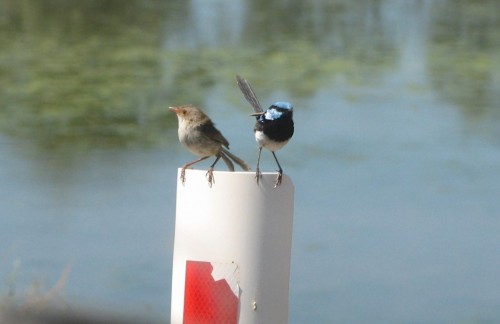Haiku #26 Blue Wren
Superb Blue Wren
Sits atop the grevillea –
A beacon of beauty.
Copyright 2006 Trevor W. Hampel
All rights reserved.
Superb Blue Wrens are one of Australia’s most loved and most beautiful birds. These endearing birds are common in parks, gardens, picnic grounds and the bushland areas of south eastern parts of the country. The photo below shows a female on the left and a male in full breeding plumage on the right.
Poem #15 Approaching Storm
Approaching Storm
White-topped, angry, boiling clouds
Deep black beneath
Jagged flashes of lightning
Window-rattling thunder rumblings
Raindrops hammering the rooftops.
All rights reserved.
Copyright 2006 Trevor W. Hampel.
Writing Hint #16 Eight Steps to Getting Published
Most writers desire to get their work published. This is a worthy goal towards which to strive. Many writers get a few articles, poems, stories and even the odd novel published. A few writers get hundreds of pieces of writing published and even fewer actually make a living from their writing.
How do you improve your chances of getting published?
8 Steps to Getting Published:
- Read: most, if not all published authors are voracious readers.
- Write: this may seem obvious, but writers write; they don’t only read about writing or talk about writing, they actually write often and write in quantity.
- Goals: successful, published authors set goals for their writing. This could include setting the number of words to write each day, the number of hours spent writing each day, deadline dates to complete a novel, story or article and so on.
- Edit: published authors edit their writing until it is as near to perfect as they can get it.
- Markets: the authors who study the markets know where to send their writing for the best chance of getting published.
- Guidelines: published writers read the publisher’s guidelines so they give themselves the best chance of being accepted for publication.
- Submit: Successful writers submit their writing to publishers. Often. A story won’t get published if it sits languishing in a desk drawer or on your hard-drive.
- Persist: Successful authors don’t give up; they are persistent. As soon as one rejection letter comes they sent off the story to another publisher. And they keep on doing it until they are successful.
- Write: Successful writers keep on writing, accepting that rejection is not personal. It’s the story that has been rejected – for whatever reason – not the author.
- Remember to read every day.
- Remember to write every day.
- Remember to take time for yourself every day.
.
Idiom #4 To feather one’s nest
It has been a while since I wrote about idioms. Time to get back on track again. This week’s idiom would probably be better posted on my Birding Blog.
This Week’s Idiom
To feather one’s nest
or
To feather one’s own nest
Origin
This idiom obviously comes from the practice of many birds to gather feathers to add to their nest in order to make it more comfortable for themselves while incubating the eggs and then warmer for the chicks once hatched. It has been suggested that some birds actually pluck their own feathers to add to the nest. I’ve never witnessed this in thirty years of birding but it could well be the case. More likely is the gathering of feathers left lying around after a bird dies, or is killed, or from the empty nests of other birds.
Meanings
The applied use of this idiom in common speech and in writing implies that the person being spoken of is gathering financial gain for himself at the expense of others, usually in a dishonest way. So to say that “Peter was feathering his own nest at the company’s expense” is to say that he was perhaps embezzling company funds.
It could also be applied to the misplaced motivation for an action. For example, “Susan only wanted to become a member of parliament to feather her own nest.”
Related article:
- What is an idiom? – including a definition.
